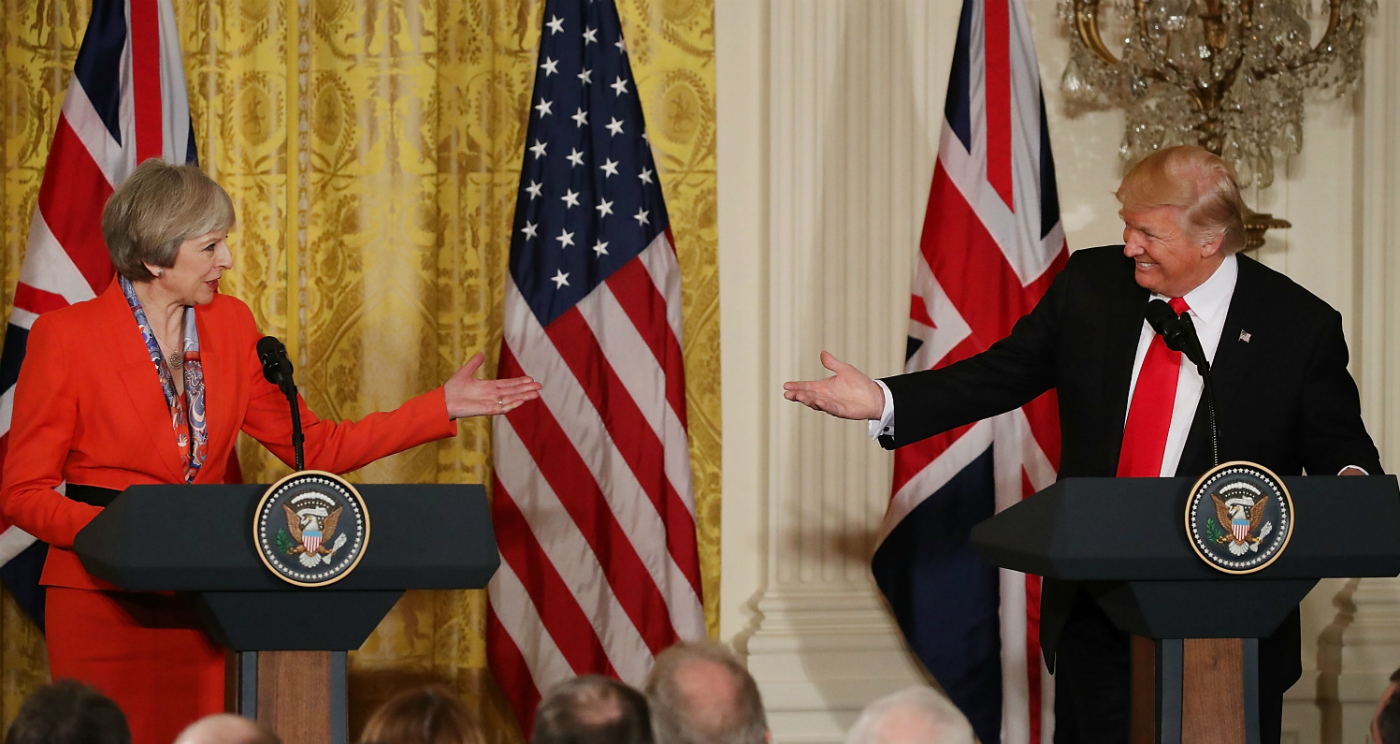How Trump-May Twitter spat will affect the special relationship
PM repeats that the President was wrong to retweet far-right videos - but says the state visit is still on

A free daily email with the biggest news stories of the day – and the best features from TheWeek.com
You are now subscribed
Your newsletter sign-up was successful
Theresa May today repeated her criticism of Donald Trump’s decision to retweet videos posted by a British far-right group but insisted that Britain’s invitation for a presidential state visit remained open.
“Retweeting from Britain First was the wrong thing to do,” the Prime Minister told reporters in Jordan, during a three-day tour of the country and its neighbour Saudi Arabia.
She also said that “an invitation for a state visit has been extended and accepted”, but added: “We have yet to set a date.”
The Week
Escape your echo chamber. Get the facts behind the news, plus analysis from multiple perspectives.

Sign up for The Week's Free Newsletters
From our morning news briefing to a weekly Good News Newsletter, get the best of The Week delivered directly to your inbox.
From our morning news briefing to a weekly Good News Newsletter, get the best of The Week delivered directly to your inbox.
May avoided responding when asked about Trump’s criticism of her handling of the UK terrorist threat.
Sky News journalist Tom Rayner interpreted the PM’s stance as an attempt to de-escalate the transatlantic spat while kicking the issue of the state visit into the long grass by failing to confirm the timings.
“Read between the lines... and what she’s saying is, ‘I’m not going to get dragged into a long-running diplomatic spat based on that tweet last night,’” Rayner said.
The Daily Telegraph characterised May’s comments as a “stinging rebuke” to Trump over the far-right retweets, while The Guardian reports that she received a round of applause but “seemed anxious to change the subject as quickly as possible”.
A free daily email with the biggest news stories of the day – and the best features from TheWeek.com
Labour MP Chuka Umunna accused Trump of “normalising hatred” after the US president shared the anti-Muslim videos yesterday.
Home Secretary Amber Rudd today urged MPs to see “the bigger picture”, as anger over Trump’s “racist” tweets grows. Rudd told Parliament that intelligence-sharing between the two countries has “undoubtedly saved British lives”.
“It’s a wholly unnecessary controversy, but the international consequences could be all too real,” the BBC says.
With the UK set to leave the EU in 2019, May has tried to forge a strong trade partnership with the US - but The Guardian’s Julian Borger suggests that even before this week’s row, UK-US relations had deteriorated under Trump.
“What can May do to limit the damage? She can be stern or she can try to laugh it off,” says Borger. “But whichever mode she adopts, she will have to distance herself from Trump in the short term while sending reassuring noises that all will be fine in the long term.”
-
 Political cartoons for February 15
Political cartoons for February 15Cartoons Sunday's political cartoons include political ventriloquism, Europe in the middle, and more
-
 The broken water companies failing England and Wales
The broken water companies failing England and WalesExplainer With rising bills, deteriorating river health and a lack of investment, regulators face an uphill battle to stabilise the industry
-
 A thrilling foodie city in northern Japan
A thrilling foodie city in northern JapanThe Week Recommends The food scene here is ‘unspoilt’ and ‘fun’
-
 Trump’s EPA kills legal basis for federal climate policy
Trump’s EPA kills legal basis for federal climate policySpeed Read The government’s authority to regulate several planet-warming pollutants has been repealed
-
 House votes to end Trump’s Canada tariffs
House votes to end Trump’s Canada tariffsSpeed Read Six Republicans joined with Democrats to repeal the president’s tariffs
-
 Bondi, Democrats clash over Epstein in hearing
Bondi, Democrats clash over Epstein in hearingSpeed Read Attorney General Pam Bondi ignored survivors of convicted sex offender Jeffrey Epstein and demanded that Democrats apologize to Trump
-
 How corrupt is the UK?
How corrupt is the UK?The Explainer Decline in standards ‘risks becoming a defining feature of our political culture’ as Britain falls to lowest ever score on global index
-
 Judge blocks Trump suit for Michigan voter rolls
Judge blocks Trump suit for Michigan voter rollsSpeed Read A Trump-appointed federal judge rejected the administration’s demand for voters’ personal data
-
 US to send 200 troops to Nigeria to train army
US to send 200 troops to Nigeria to train armySpeed Read Trump has accused the West African government of failing to protect Christians from terrorist attacks
-
 Grand jury rejects charging 6 Democrats for ‘orders’ video
Grand jury rejects charging 6 Democrats for ‘orders’ videoSpeed Read The jury refused to indict Democratic lawmakers for a video in which they urged military members to resist illegal orders
-
 Trump links funding to name on Penn Station
Trump links funding to name on Penn StationSpeed Read Trump “can restart the funding with a snap of his fingers,” a Schumer insider said